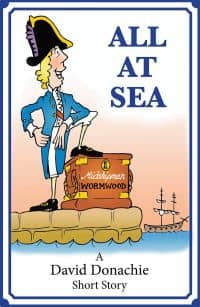I've written many stories set in the 18th Century, detailing the activities of naval heroes, as well as villains and even, I suppose, raised the odd smile. Yet there were things to wonder and laugh at as well, many more to shock modern sensibilities. It is to these I have turned in The Wormwood Saga, a series of stories in what, I hope, will appeal to the readers’ sense of humour in the same way as, when writing them, it tickled mine.
Numerous books on Nelson's Navy tell of heroic deeds, as upright patriots sought to confound Britannia's enemies. Yet for every sailor committed to defeating his country's foes, there were many more with motives less upright, some expressing notions which today would be considered downright treasonous. In the late 18th Century, nothing could be gained without interest or the aid of the powerful and wealthy, while the spectre of poverty was ever-present. There were no cracks in social provision, they were chasms and one simple error could damn any man or woman to a precipitous fall. Given such jeopardy was a daily concern, it was seen perfectly acceptable to look to one's own concerns as well as, and even prior to, the needs of the nation. In the narrative of the wars against the French, these characters and their activities have been alluded to but, in truth, mostly lightly brushed over. No more! The Wormwood Saga seeks to redress this imbalance by taking you into the world of men, both civilian and serving, who saw the public purse as an extension of their own, of time serving captains and useless admirals, of the ingrates who pandered to the wishes of the rich and politically well-connected, as well as the devious activities of a lower deck often wiser and more self-serving than their superiors.
But it is also the world of those foolish or deluded enough to be downright dangerous? Into this era of commonplace venality comes Charles de Vere Wormwood, scion of a rich, noble and corrupt father, a sailor by parental coercion rather than inclination. Forced to make his way, as best he can, in a profession he abhors, while also entirely lacking in even a semblance of courage, Wormwood will dissemble, lie and cheat his way up the naval ladder in the hope of rising high enough to get out of ever having to go to sea again, an aim in which he will be constantly thwarted.In doing so he will encounter some of the great figures of the age, none of whom, in his estimation, live up to the legends being created around their name. Quite the reverse: every hero has an Achilles Heel, either vainglorious or too trusting, and this is what Wormwood will seek and exploit in pursuit of his own interest. All the tropes of Naval Fiction are there in these short stories: Press Gangs, floggings, battles won and lost, acts of bravery and foolish bravado, added to the deviousness required by Wormwood to never put himself at risk. This is an aim continually ruined by a hero worshiping and eager subordinates, while being partly mitigated by the least desirable servant of the time.It was also an age of debauchery and one into which our hero will happily throw himself. Handsome and an immoral rogue, Charles Wormwood will employ seduction as well as charm and downright falsehood to bend both sexes to his needs and ambitions. Too often though, his desires and a lack of self-control will give him more trouble than pleasure, in what is known to posterity as the Age of Enlightenment.Join me as I throw a little light of the obverse side of the coin. DAVID DONACHIE
